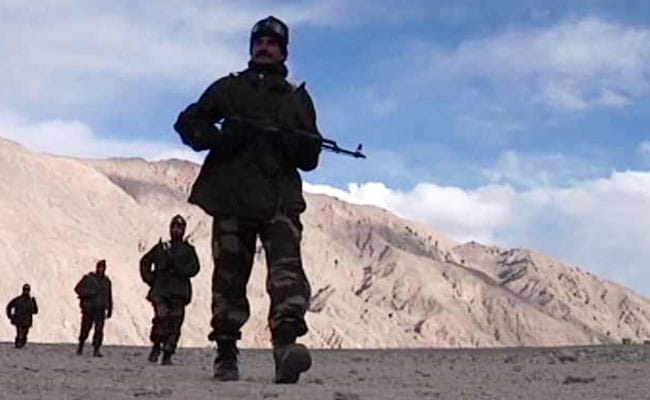
India has said it is "deeply concerned at the recent Chinese actions" in Sikkim.
New Delhi:
China today said that its border with India in Sikkim is well-demarcated and the Indian Army's action there over the last month is a "betrayal" of the position taken by successive Indian governments.
"Former Indian Prime Minister Jawaharlal Nehru endorsed the 1890 Sino-British Treaty on Sikkim in a letter to the then Chinese counterpart Zhou Enlai in 1959. Successive Indian governments have also endorsed this," Chinese foreign ministry spokesman Geng Shuang said at a media briefing.
He said India needs to observe the Treaty and pull back troops immediately from Doklam.
Indian troops crossed the de facto border or Line of Actual Control a month ago to stop the construction of a new road that China is building on the Himalayan border on Friday, saying it raises "serious security" concerns.
The new hotspot has emerged in a remote scrap of territory where the frontiers of China, India and Bhutan meet.
Beijing made a formal protest last week, accusing Indian border guards of crossing from the north eastern state of Sikkim into its Tibetan territory to stop the road building.
But India said on Friday that China's People's Liberation Army (PLA) troops entered the area to "unilaterally" construct the road.
"India is deeply concerned at the recent Chinese actions and has conveyed to the Chinese government that such construction would represent a significant change of status quo with serious security implications for India," said a statement from the Foreign Minisiry.
"India cherishes peace and tranquillity in the India-China border areas. It has not come easily," it said, urging Beijing to resolve the skirmish through dialogue.
Bhutan has also lodged a formal protest to China, saying the road violated a bilateral agreement.
China insists that it has every right to build the road and that it controls the territory under an 1890 accord made with Britain when it was colonial power in the region.
Flare-ups around Sikkim are rare. It is the least populous and second smallest of India's states, but its location gives it strategic importance.
India's seven remote north eastern states are connected to the rest of the country by a narrow sliver of land known as the "chicken's neck". Sikkim is wedged between Nepal, Bhutan and China.
"The Chinese have realised that India is vulnerable at the 'chicken neck' so it could be a way to test the reaction of the Indian establishment," said Sameer Patil, a defence and security analyst at the Mumbai-based Gateway House think-tank.
The military stand-off at Sikkim comes amid China blocking India's efforts to become a member of the Nuclear Suppliers Group, the international club that controls the global nuclear trade.
Delhi has also objected to China for financing infrastructure in Pakistan-Occupied Kashmir as part of its $54 billion China Pakistan Economic Corridor.
In retaliation for the Indian army's action, Beijing has blocked the entry of Indian pilgrims hoping to cross the Sikkim border to visit Mount Kailash in Tibet, which violates a two-year-old accord.
"Former Indian Prime Minister Jawaharlal Nehru endorsed the 1890 Sino-British Treaty on Sikkim in a letter to the then Chinese counterpart Zhou Enlai in 1959. Successive Indian governments have also endorsed this," Chinese foreign ministry spokesman Geng Shuang said at a media briefing.
He said India needs to observe the Treaty and pull back troops immediately from Doklam.
Indian troops crossed the de facto border or Line of Actual Control a month ago to stop the construction of a new road that China is building on the Himalayan border on Friday, saying it raises "serious security" concerns.
The new hotspot has emerged in a remote scrap of territory where the frontiers of China, India and Bhutan meet.
Beijing made a formal protest last week, accusing Indian border guards of crossing from the north eastern state of Sikkim into its Tibetan territory to stop the road building.
But India said on Friday that China's People's Liberation Army (PLA) troops entered the area to "unilaterally" construct the road.
"India is deeply concerned at the recent Chinese actions and has conveyed to the Chinese government that such construction would represent a significant change of status quo with serious security implications for India," said a statement from the Foreign Minisiry.
"India cherishes peace and tranquillity in the India-China border areas. It has not come easily," it said, urging Beijing to resolve the skirmish through dialogue.
Bhutan has also lodged a formal protest to China, saying the road violated a bilateral agreement.
China insists that it has every right to build the road and that it controls the territory under an 1890 accord made with Britain when it was colonial power in the region.
Flare-ups around Sikkim are rare. It is the least populous and second smallest of India's states, but its location gives it strategic importance.
India's seven remote north eastern states are connected to the rest of the country by a narrow sliver of land known as the "chicken's neck". Sikkim is wedged between Nepal, Bhutan and China.
"The Chinese have realised that India is vulnerable at the 'chicken neck' so it could be a way to test the reaction of the Indian establishment," said Sameer Patil, a defence and security analyst at the Mumbai-based Gateway House think-tank.
The military stand-off at Sikkim comes amid China blocking India's efforts to become a member of the Nuclear Suppliers Group, the international club that controls the global nuclear trade.
Delhi has also objected to China for financing infrastructure in Pakistan-Occupied Kashmir as part of its $54 billion China Pakistan Economic Corridor.
In retaliation for the Indian army's action, Beijing has blocked the entry of Indian pilgrims hoping to cross the Sikkim border to visit Mount Kailash in Tibet, which violates a two-year-old accord.
Track Latest News Live on NDTV.com and get news updates from India and around the world

